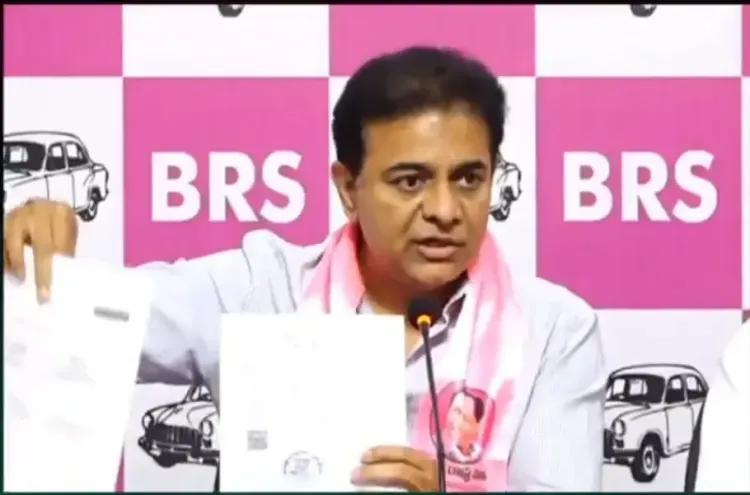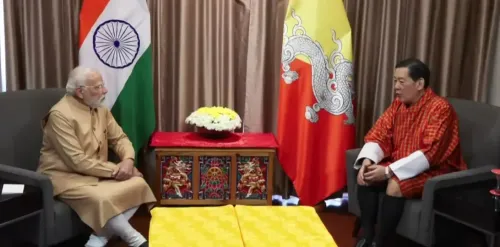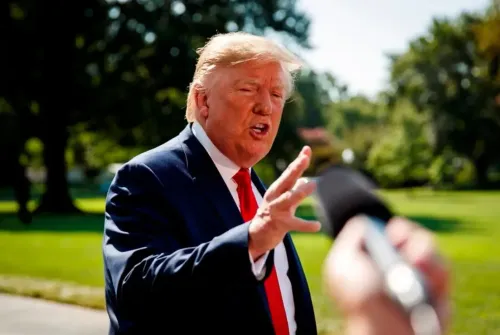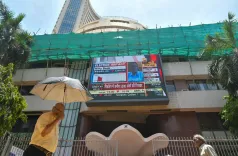KTR Alleges Rs 10,000 Crore Scam Involving Hyderabad University Land

Synopsis
Key Takeaways
- KTR accuses CM of a major financial scam.
- 400 acres of forest land pledged illegally.
- Allegations of valuation manipulation.
- Environmental laws reportedly violated.
- BJP MP implicated in the scheme.
Hyderabad, April 11 (NationPress) K.T. Rama Rao, the Working President of Bharat Rashtra Samithi (BRS), accused Telangana Chief Minister A. Revanth Reddy of masterminding a monumental Rs 10,000 crore financial scam concerning lands in Kancha Gachibowli adjacent to Hyderabad Central University.
During a press briefing, KTR, widely recognized by his initials, asserted that the state government unlawfully pledged 400 acres of forest land near Hyderabad Central University to secure a Rs 10,000 crore loan from financial institutions.
Labeling this incident a 'criminal conspiracy' and a 'betrayal of Telangana’s trust', he designated Revanth Reddy as the 'architect, executor, and key player' of this scheme, promising to escalate the matter to the RBI, the SFIO, the SEBI, and other central authorities.
KTR alleged that the land was pledged unlawfully without confirming ownership, conducting environmental assessments, or acquiring approvals from the Forest Department. He contended that the Telangana Industrial Infrastructure Corporation (TGIIC) mortgaged the land without legal ownership, lacking a sale deed or proper title documentation.
He pointed out a striking inconsistency in the land's valuation, stating that the government initially assessed the 400 acres at Rs 30,000 crore, issuing a Government Order (GO) in June 2024 that assigned a per-acre value of Rs 75 crore. However, just five months later, in November 2024, a new evaluation by a different agency reduced this to Rs 52 crore per acre, with a subsequent open-market assessment further diminishing it to Rs 41.6 crore, thereby lowering the total value.
KTR questioned the logic behind this drastic reduction, alleging it was a calculated strategy to enable the transfer of the land to associates of Revanth Reddy at a fraction of its inflated worth.
Referencing the Stamps and Registration Department, KTR highlighted that the market value in the Kancha-Gachibowli region stands at Rs 26,900 per square yard, equating to a total of Rs 5,239.84 lakh for 400 acres. 'How can land valued at Rs 5,000 crore be inflated to Rs 30,000 crore and then conveniently reduced to Rs 16,640 crore? This is a classic case of financial manipulation.'
He accused a bank of severe negligence in granting the Rs 10,000 crore loan without verifying land ownership or carrying out necessary due diligence. KTR also claimed that a BJP MP played a crucial role in facilitating the fraud.
'This BJP MP will be named shortly. The state government has promised undue advantages to him through this arrangement,' he warned, indicating that the Central government’s inaction would confirm a BJP-Congress collusion.
KTR alleged that hundreds of acres of forest land were cleared overnight, destroying ecosystems and wildlife habitats. 'This wasn’t just about financial theft - it was about obliterating Telangana’s green cover and robbing vulnerable animals of their homes. The nation observed in shock as Revanth Reddy’s government committed this ecological devastation.'
The BRS leader cited a 1996 Supreme Court decision that categorizes land with forest characteristics, such as the point-four canopy found within the 400 acres, as forest land, irrespective of ownership documentation. According to the Forest Conservation Act of 1980, such lands cannot be pledged, sold, or used for non-forest purposes without authorization from the Central government, a protocol the state government allegedly neglected. No environmental impact assessment was performed, and permissions from the forest department were bypassed, rendering the entire transaction illegal, he concluded.









